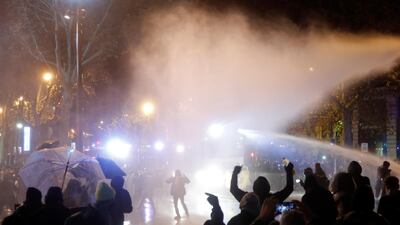Water cannon was fired and scuffles broke out during protests against a proposed new security law in France that could make it illegal to record police officers.
Police in Paris detained about 150 people at a tense and sometimes ill-tempered rally, but also one without widespread violence.
Protesters were in the capital for the third successive weekend and similar demonstrations were also staged in Montpellier, Strasbourg, Lille, Toulouse and Marseille.
The controversial security bill would limit filming of the police, leading critics to fear it will be harder to document cases of police brutality and wrongdoing.
Footage of white police beating up an unarmed black music producer in his Paris studio on November 21 stoked anger over the proposed legislation. Other incidents caught on camera have shown police in Paris using violence to tear down a migrant camp.
The bill, which is being partly rewritten, aims to outlaw the publication of images with intent to cause harm to police.
But the move has not placated left-wing protesters and civil rights groups, who are demanding that the law be completely withdrawn.
"Global repression, total regression," read a placard held by one demonstrator, a reference to the new "global security" bill which bans the "malevolent" publication of images showing the faces of police officers in action.
Other slogans on placards carried by marchers in Paris read: "I will never stop filming" and "Camera equals mutilation?"
Long lines of riot officers and police vehicles with blue lights flashing escorted Saturday's march, hemming in protesters and seeking to prevent the violence that marked some previous demonstrations.
Interior Minister Gerald Darmanin tweeted that 142 people were arrested in Paris.
In Montpellier, protester Anne-Marie Briand, a doctor, summed up the government's problem in trying to improve police and community relations.
She carried a banner reading "a blurry cop is a dodgy cop" – referring to the law's ban on publishing images that allow an officer to be identified where the intention is to cause the officer "physical or psychological harm".
The recurring allegations of racism and brutality against police have become a major headache for President Emmanuel Macron as he pushes the new bill.
In a letter to a police union leader, he announced plans for a summit in January on how to improve relations between the police and communities.
"There is urgent need to act," Macron said in the letter to the Unite-SGP-FO police union.


